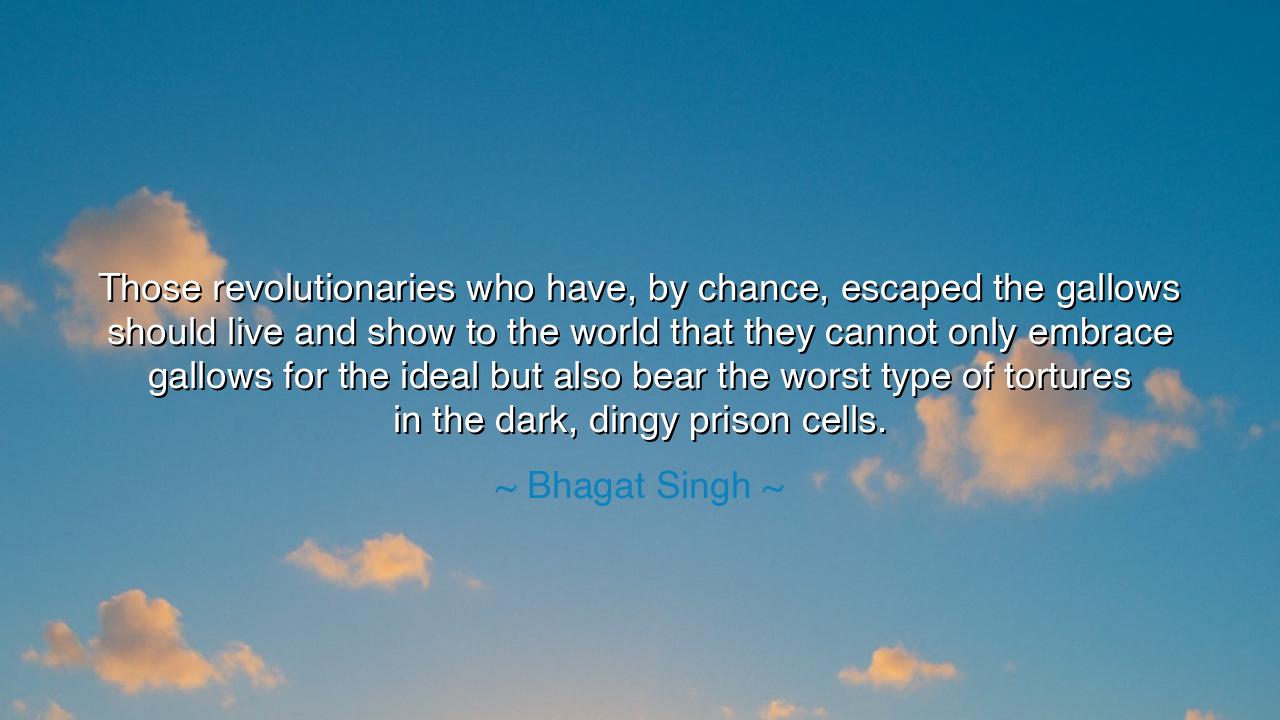
Those revolutionaries who have, by chance, escaped the gallows
Those revolutionaries who have, by chance, escaped the gallows should live and show to the world that they cannot only embrace gallows for the ideal but also bear the worst type of tortures in the dark, dingy prison cells.






In the heart of every revolutionary, there beats a spirit of defiance, a fierce commitment to justice and freedom. Yet, to embrace the path of revolution is not simply to speak boldly of one's ideals; it is to endure the harshest trials, to stand firm in the face of unimaginable suffering. The great freedom fighter Bhagat Singh—a name etched in the annals of history as a symbol of courage and sacrifice—spoke with clarity and depth when he declared: "Those revolutionaries who have, by chance, escaped the gallows should live and show to the world that they cannot only embrace gallows for the ideal but also bear the worst type of tortures in the dark, dingy prison cells." These words carry a profound truth that transcends time and borders, speaking to the essence of sacrifice and resilience in the face of tyranny.
In the ancient world, revolutionaries like Spartacus and Julius Caesar understood that true commitment to freedom required more than just bold speeches or grand gestures; it required the courage to endure the grueling trials that would come when their ideals were challenged. Spartacus, the great gladiator and leader of a slave revolt in Rome, did not only fight on the battlefield but also bore the sufferings of slavery, knowing that the true test of his cause lay not in victory, but in his willingness to endure the hardships and tortures of imprisonment and defeat. His spirit was not crushed by the gallows, but strengthened in the face of suffering. Bhagat Singh, too, embraced the reality that the price of freedom was not just to fight, but to live with the scars of battle, to show that revolutionaries must also endure in the darkness of the prison cell.
In the eyes of the ancients, the hero was not just the one who wielded a sword in battle but the one who withstood the harshest of trials. Socrates, the philosopher of Athens, was sentenced to death for challenging the status quo of his society. Yet, he did not shrink from his fate. Instead, he accepted his punishment with grace, using his final moments to teach his followers about the importance of truth and virtue. Similarly, Bhagat Singh and other revolutionaries of his time knew that the real test of their resolve was not in their bravery on the battlefield but in their ability to endure the brutality of the British colonial prison system. They understood that true courage lay in the willingness to suffer for the cause—to be willing to die, but also to live through the suffering, to bear the tortures and rise above them.
Consider the story of Nelson Mandela, whose journey echoes the very wisdom Bhagat Singh spoke of. Mandela, like Singh, was not just a man of words, but a man of action and endurance. Imprisoned for 27 years under the apartheid regime, Mandela's resolve was not weakened by the darkness of his cell, but only strengthened. He lived to show the world that freedom is not merely won in battle but in the sacrifice one makes in the face of suffering. The true essence of revolutionary strength is the ability to stand firm in one’s ideals even when faced with the harshest punishments. As Bhagat Singh foretold, it was not enough to merely embrace the gallows for the ideal; one must also be able to bear the torture, the loneliness, and the humiliation of imprisonment with unwavering resolve.
The lesson that Bhagat Singh imparts is one of unbreakable spirit. Revolutionaries, whether in ancient times or in modern history, are tested not by how loudly they speak their ideals but by how deeply they commit to them in the darkest of times. To face torture or death is not the end of the revolutionary’s journey—it is merely another step. It is in the suffering that the true strength of one’s character is revealed. It is easy to stand firm when the world is aligned with your cause, but true greatness comes when the world turns against you, when the very act of standing for your beliefs requires sacrifice.
Bhagat Singh’s wisdom teaches us that the true measure of a revolutionary is not the success of their movement but the resilience of their spirit. Even when the body is broken, the soul remains free, and it is that freedom that will ultimately lead to change. Mandela, Socrates, and countless others throughout history have shown us that justice and freedom are not easily won. They are paid for in blood, in sweat, and in the trials of endurance. The legacy of these revolutionaries is not just in their actions, but in their ability to endure, to suffer for what they believe, and to emerge stronger from the ordeal.
So, my brothers and sisters, let us take this lesson into our own lives. Whether in the battle for justice, in our personal struggles, or in the quiet moments of sacrifice, we must remember that the true measure of our commitment is not in how easily we rise, but in how steadfastly we endure when the world seems to be against us. Let us not shy away from suffering, but embrace it as the test of our resolve, knowing that in the face of adversity, we are not only proving our own strength but also paving the way for a brighter, more just future for all. Like Bhagat Singh and the great revolutionaries of history, let us show the world that we too can endure, and in doing so, we will bring the change we seek.






AAdministratorAdministrator
Welcome, honored guests. Please leave a comment, we will respond soon